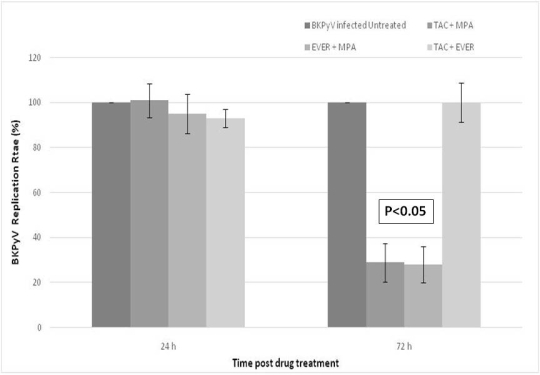Mycophenolic Acid Reduces BK Polyomavirus Replication in an In Vitro Model of Renal Tubular Epithelial Cells Infection
1Kidney Transplantation, Fondazione IRCCS Ca&apos
Granda, Milan, Italy
2Biomedical, Surgical and Dental Sciences, University of Milan, Milan, Italy.
Meeting: 2018 American Transplant Congress
Abstract number: D33
Keywords: Immunosuppression, Kidney transplantation, Mycophenolate mofetil, Polyma virus
Session Information
Session Name: Poster Session D: Immunosuppression Preclinical Studies
Session Type: Poster Session
Date: Tuesday, June 5, 2018
Session Time: 6:00pm-7:00pm
 Presentation Time: 6:00pm-7:00pm
Presentation Time: 6:00pm-7:00pm
Location: Hall 4EF
Background. BK virus (BKV) nephropathy is an important cause of allograft failure after kidney transplant. Immunosuppression is a recognized risk factor for BKV replication but specific contribution of different immunosuppressive agents remains unclear. Even though, a recent report has shown that mammalian target of rapamycin inhibitor sirolimus may exert a protective role against BKV replication, properly designed in vitro studies addressing this issue are lacking. Methods. Vero cell lines derived from Green monkey kidney epithelial cells were cultured and infected with 108 virions of BKV archetype (WW) strain stock. Two hours after the infection, single immunosuppressive medications (tacrolimus 20 ng/mL, TAC; mycophenolic acid 250 ng/mL, MPA; everolimus 8 ng/mL, EVER) and their combinations (TAC plus MPA, TAC plus EVER, EVER plus MPA) were added. Replication rates of extracellular BKV were evaluated after 24 and 72 hours of treatment. Infected untreated cells were used as controls. Results. As depicted in the figure,  during the first 24 hours, BKV replication was not affected by any of the agents or their combinations. After 72 hours, we observed that BKV replication was significantly reduced (up to 80% decrease) in cells treated with MPA, TAC plus MPA, and EVER plus MPA. EVER alone and TAC plus EVER did not modify BKV replication, which was maintained at a very high level (up to 5 x 105 copies/mL). This last result was further confirmed in a Renal Tubular Epithelial Cells (RPTEC) in vitro model. Conclusions. Our data suggest that MPA has antiviral properties against BKV. Moreover, BKV infected renal tubular epithelial cells treated with MPA in combination with TAC or EVER show significantly lower replication rates than those not receiving an MPA-based immunosuppressive scheme. We did not observe any significant effects of sirolimus or everolimus on BKV replication. Extensive research into optimal avoidance and treatment strategies for BKV infection is encouraged.
during the first 24 hours, BKV replication was not affected by any of the agents or their combinations. After 72 hours, we observed that BKV replication was significantly reduced (up to 80% decrease) in cells treated with MPA, TAC plus MPA, and EVER plus MPA. EVER alone and TAC plus EVER did not modify BKV replication, which was maintained at a very high level (up to 5 x 105 copies/mL). This last result was further confirmed in a Renal Tubular Epithelial Cells (RPTEC) in vitro model. Conclusions. Our data suggest that MPA has antiviral properties against BKV. Moreover, BKV infected renal tubular epithelial cells treated with MPA in combination with TAC or EVER show significantly lower replication rates than those not receiving an MPA-based immunosuppressive scheme. We did not observe any significant effects of sirolimus or everolimus on BKV replication. Extensive research into optimal avoidance and treatment strategies for BKV infection is encouraged.
CITATION INFORMATION: Favi E., Delbue S., Colico C., Ferrante P., Villani S., Perna I., Mondoni N., Giussani A., Ferraresso M. Mycophenolic Acid Reduces BK Polyomavirus Replication in an In Vitro Model of Renal Tubular Epithelial Cells Infection Am J Transplant. 2017;17 (suppl 3).
To cite this abstract in AMA style:
Favi E, Delbue S, Colico C, Ferrante P, Villani S, Perna I, Mondoni N, Giussani A, Ferraresso M. Mycophenolic Acid Reduces BK Polyomavirus Replication in an In Vitro Model of Renal Tubular Epithelial Cells Infection [abstract]. https://atcmeetingabstracts.com/abstract/mycophenolic-acid-reduces-bk-polyomavirus-replication-in-an-in-vitro-model-of-renal-tubular-epithelial-cells-infection/. Accessed March 5, 2026.« Back to 2018 American Transplant Congress
